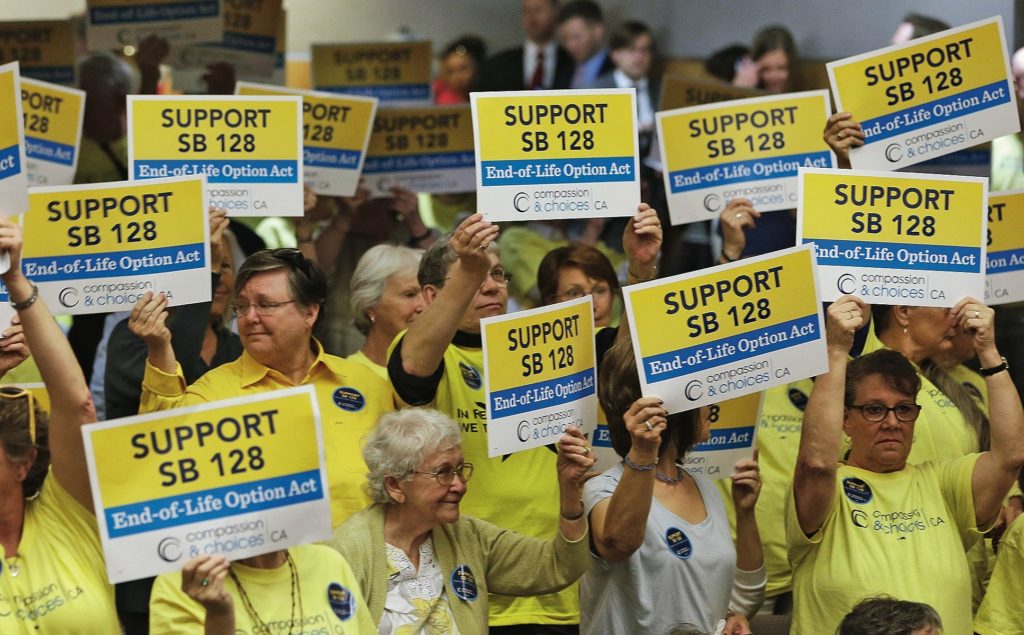Brittany Maynard’s battle with virulent brain cancer was compelling and heartbreaking, but today it wasn’t enough to sway key California lawmakers. Her decision to end her life last year at age 29 galvanized a campaign to make it legal for doctors to prescribe lethal drugs for terminally ill patients, but this morning the sponsors of the End of Life Option Act shelved the bill until next year, acknowledging that for now, they lacked the votes to secure passage in the Assembly Health Committee.
“I am not deterred,” says Brittany’s husband, Daniel Diaz, who was in Sacramento for the hearing. “This makes me more determined. I have faith in this bill.”
Sponsors Democratic Sens. Lois Wolk of Davis and Bill Monning of Carmel released a statement saying they would “continue to work with Assembly members to ensure they are comfortable with the bill.” But supporters also haven’t ruled out the possibility of resorting to a ballot initiative if the Legislature fails to act. “All options are open,” says Diaz. “In the end, polls show the public support is there.”
Among opponents warning that the bill would have detrimental, even if unintended, consequences: the California Catholic Conference and the disabilities rights group Not Dead Yet.
Maynard, a Cal graduate, became the very public face of the debate after she moved to Oregon, one of five states allowing physicians to help the terminally ill end their lives. “I did this,’’ she said, ‘’because I want to see a world where everyone has access to death with dignity, as I have had.”
Her story—how she was diagnosed shortly after marrying fellow UC Berkeley alum Diaz, painstakingly researched the disease, and ultimately decided to end her life in November when her suffering was unbearable—made the cover of People magazine and traveled around the world.
“It’s the promise I made to Brittany because I also believe that no one should have to go through what she went through. To have to up and move, in the middle of the chaos of being told you are terminally ill, no one should have to do that.”
“She opened the eyes of Californians and opened the conversation,” says Patricia Gonzalez-Portillo, a spokeswoman for Compassion and Choices, a nonprofit orchestrating the fight to pass the bill. “She left a legacy for us and I’m sure she would be proud to see the progress.”
Diaz had been getting to work as a market researcher at 7 a.m., coming home at 6 p.m., and spending the next five hours glued to his computer, writing editorials, arranging meetings and interviews. “It’s the promise I made to Brittany because I also believe that no one should have to go through what she went through,” he says. “To have to up and move, in the middle of the chaos of being told you are terminally ill, no one should have to do that. …This legislation doesn’t result in more people dying. It results in fewer people suffering.”
Opponents have been equally busy. An array of religious organizations and disability rights groups have spoken to Assembly members.
Los Angeles Archbishop Jose Gomez has said the measure has “dangerous implications” for the poorest and most vulnerable citizens. His concern was echoed in a statement by Ned Dolejsi, executive director of the state’s Catholic Conference: “We understand and share the concern for the dying expressed at today’s hearing. It is a natural impulse for human beings. But when someone asks for assistance in killing themselves, it is really a call for help, care and compassion during the dying process. California law already allows for patients to refuse extraordinary care, but that is a far cry from aiding a patient in actively ending his or her life.”
“If these bills pass, some peoples lives will be ended without their consent, through mistakes and abuse,” Marilyn Golden, a senior policy analyst in Berkeley for Disability Rights Education & Defense Fund, has said.
Diaz, who also recently spoke at the Aspen Institute, has been talking to legislators, joining Maynard’s mother and others in all-out push for the bill.
Last week, labor and civil rights activist Dolores Huerta added her support, talking to Latino committee members who balked at voting for it. “This is an important measure that really gives families and individuals the right to make that choice if they want to end their lives with dignity when they know that otherwise it would be very torturous and terrible thing for them to go through,” she said. “This is a responsibility of the Legislature in a democratic process to give people that right.”
The practice remains so controversial that there is not even agreement over how to refer to an end of life decision—opponents call it “assisted suicide” while supporters prefer the terms “death with dignity” or “physician-assisted death.” Leaders on both sides even attack each other’s terminology as offensive: Proponents of the measure say labeling it “assisted suicide” ignores the fact that terminal patients have no choice about whether to die, only the time and circumstance of their end. Opponents say labeling it “death with dignity” insultingly implies that terminal patients who choose to fight for every moment of life are somehow foregoing a dignified end.
Calling the practice “the slipperiest of slopes” that would make people “mistrust a health-care system under considerable pressure to drive down costs,” he notes that in the past 20 years, all but three of the more than 100 assorted state campaigns to legalize the practice have failed.
The End of Life Option Act would allow mentally competent adults who are diagnosed as terminally ill to request a lethal prescription. Unlike Oregon’s law, it would give pharmacists, as well as doctors, legal immunity and requires that non-English speakers be provided with translators. It also would allow individual physicians and hospitals to elect not to participate—which helped convince the California Medical Association to switch its historical opposition and instead become officially neutral on the bill.
The amended version bill passed the California Senate before running into serious obstacles in the Assembly .
“Proponents who favor placing society’s stamp of approval on suicide find themselves increasingly on the losing end of public debate,” argues Aaron Kheriaty, associate clinical professor of psychiatry at the University of California at Irvine. Calling the practice “the slipperiest of slopes” that would make people “mistrust a health-care system under considerable pressure to drive down costs,” he notes that in the past 20 years, all but three of the more than 100 assorted state campaigns to legalize the practice have failed.
In a recent poll of state voters sponsored by Compassion and Choices and conducted by two independent opinion research firms, 69 percent said they approve of the bill. So, too, did religious groups: 60 percent of Catholics, 65 percent of non-evangelical Protestants and 57 percent of evangelical Christians. And a majority of all ethnicities—including 70 percent of Latinos—were in favor.
A Gallup Poll conducted in May found that 68 percent of respondents nationwide supported a patient’s right to assisted death. In its analysis, Gallup noted the influence of Brittany Maynard in the national conversation. “The larger effect that Maynard’s story will have is uncertain, but some notable changes in support are evident compared with last year,” the analysis said. “The percentage of young adults aged 18 to 34 who support doctor-assisted suicide climbed 19 points this year, to 81%. Young adults are now significantly more likely than older U.S. adults to support doctor-assisted suicide.”
Members of the committee, particularly Latino and Catholic members, remained apprehensive. But Diaz, who is Cuban American, had said he is cautiously optimistic: “That is my demographic. They are thinking, wait a second, if this happens to them, or someone in their family, then of course that person needs to be the one controlling the process.”
After shelving the legislation, sponsors Democratic Sens. Lois Wolk of Davis and Bill Monning of Carmel released a statement saying they would “continue to work with Assembly members to ensure they are comfortable with the bill.”





















